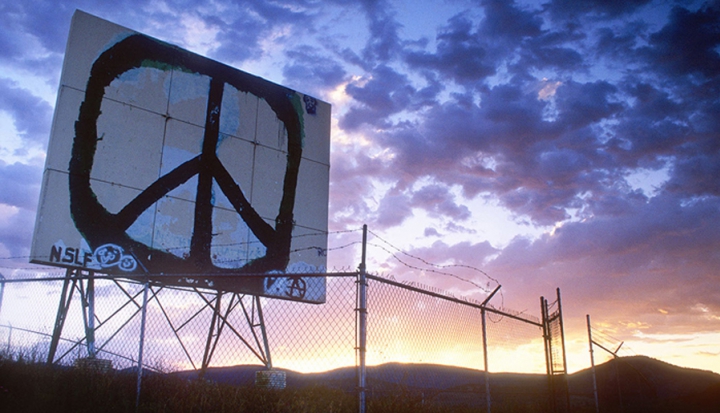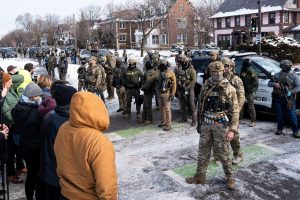When Betsy Mulligan-Dague went to her first Veterans Day remembrance ceremony in Missoula, Montana in 2005, she worried that if the veterans recognized her as the executive director of the local Jeannette Rankin Peace Center, they might regard her as the enemy.
She was right. Dan Gallagher did.
The Vietnam vet leading the ceremony had returned from his 13-month tour as a demolitions specialist on December 9, 1967, only to be confronted by an anti-war demonstration at the front gate of Fort McChord. One protestor in particular had caught his eye: a pretty woman with long blonde hair, about his age, 20. She’d brandished a sign written in red paint like dripping blood: “Baby Killer.” “I saw more hate in her eyes than I had seen in the eyes of the Viet Cong,” Gallagher says.
Seeing that protestor scarred him. He had served proudly for a cause he believed in yet, 40 years later, Dan could close his eyes and still see her face. He also saw her face in other anti-war protestors. He knew that there were people genuinely interested in bringing about peace, but he had trouble getting past the anger that had ambushed him upon his return.
Betsy had not come to the Veterans Day ceremony as an adversary; she wanted to pursue peace. But when she told colleagues her plan, they responded, “Why do you want to build bridges toward the veterans? They’re the problem. They’re the enemy.”
The intensity of feelings and beliefs about the Vietnam War divided a generation in the 1960s and ’70s and calcified into a wedge of anger and mistrust between the two camps Betsy and Dan represented. The two did not confront one another that day, but they would soon and, by listening to one another, find a way to build a bridge across the chasm that divided them.
Dan and Betsy got to know one another when Saint Paul, Minnesota filmmaker Jan Selby decided to make a documentary about the giant peace sign on the hill above Missoula. Selby found in the two of them articulate spokespeople for the symbol that had polarized the town.
Betsy, 59, had attended a Catholic all-girls high school in Little Rock, Arkansas and been raised by devout Catholic parents who embraced the commandment, “Thou shalt not kill.” When she first saw the sign on the hill, she knew she belonged in Missoula.
Conversely, when Dan woke one morning to see the sign painted on a telephone company reflector by a clandestine group, he took it as a personal affront. “The peace sign symbolized everything negative they said about us, and it became something we learned to hate,” he says.
Dan, 69, a semiretired attorney, is thoughtful and articulate. He still believes that it was right to intervene in Vietnam to combat communism, but he did not support the first Iraq war. He writes poetry, which he finds cathartic, and hosts Veteran’s Viewpoint, a radio show that airs on the local public radio station KUFM. Inspired by Selby’s film project, he invited Betsy onto his show for an hour-long discussion about peace.
The two discovered they had more in common than they realized. Both had been raised in Catholic homes where their fathers challenged their opinions and encouraged spirited yet respectful dinner table discussions. So, perhaps not surprisingly, their on-air exchange—which Selby also filmed—was not contentious like so much talk radio, but respectful.
Dan was surprised to see, in this peacenik sitting in the studio across from him, not the angry blonde woman from his memory, but someone who listened to him without criticism. “I saw an incredibly decent, intelligent, and articulate person in Betsy,” he says. “I had to back up and realize that I had been labeling these people if not wacko, at least as naïve, but she was making sense. I thought, ‘If she’s going to listen to me, I need to listen to her.’ ”
Betsy similarly realized the need to move beyond stereotypes and a self-righteous mindset. “Sometimes people in the peace community can be aggressive and think they have the right answer and the moral ground,” she says. “We need to approach people with other ideas with more curiosity and willingness to learn from them.”
Selby’s 2014 award-winning film Beyond the Divide tells the story of the relationship that developed between Betsy and Dan through their ongoing dialogue. Part of the new understanding that emerged for Betsy was being able to make the distinction between a soldier as a person and a war she opposed. “If I attack the war, I can see how they may see that as I’m attacking them, unless I build a bridge that says [I understand] you are a person, you are not the war,” she says in the film. “I think that’s part of the healing that has to occur.”
For Dan it was healing to be approached in that way and to be able to express himself without being dismissed.
“I didn’t have to stop being a veterans’ advocate around Betsy,” he says.
That acceptance of who he was helped him to forgive those who had hurt him in their opposition to the war. His Catholic faith helped him get there. “I really admire Jesus, what he said and what he stood for,” Dan says. “My mom and dad raised me that you have got to act out your faith and can’t just say it. When I’m having an ethical conflict, I ask myself, ‘What would Jesus do? What would my mom do?’ I had to forgive. My Catholic faith had a lot to do with it. If you live that out, you can’t just walk belligerently and arrogantly.”
In 2011 Dan invited Betsy to speak at the annual American Legion Post 101 Veterans Day ceremony. Standing at the podium, Betsy expressed regret for the way some peace advocates had disparaged veterans. “It removed the opportunity we had to learn from each other, to listen to and appreciate each other,” she said. “I am here today to do that, to try to right a wrong and reopen a door.”
After the ceremony, veterans came up to shake Betsy’s hand and thank her. Dan chokes up in the film when he comments on her speech: “That statement of regret and apology for what had been done to the veterans by those supposedly advocating for peace was something we had waited 40 years to hear.”
The following year, when the staff at the Jeannette Rankin Peace Center was considering whom to honor with its annual Peacemaker Award, the decision was unanimous. When Betsy told Dan they had selected him, he reacted, “You’ve got to be kidding.” She wasn’t. Dan had reinforced the lessons her parents had taught her. “You can argue with one another and still get up at the end of it, put your arm around one another and be friends,” she says. “Dan models that very well.”
In his acceptance speech, Dan spoke of the courage he saw not only on the battlefield but also in anyone fighting for a cause. “I salute not only my fellow veterans and soldiers but all of you who are willing to stand on principle, especially for those who speak the language of peace.”
He closed with the words he used to say as a boy serving Mass: “For each of you who seeks to find common ground in spite of obstacles and rejections, dona nobis pacem (give us peace).”
Over the past five years Dan and Betsy have become friends. They get together for lunch about once a month. They remember each other’s birthdays. They quote one another when talking about peace. Dan wants Betsy to be one of his pallbearers when the inevitable day arrives. “That’s a statement of the respect and friendship I have for her,” he says.
Such a friendship was once unthinkable for him. “I thought I would go to my grave hating the people who hurt me when I came back.”
The peace symbol no longer stands on the hillside above Missoula—it’s been years since the phone company removed the structure—but today there is a new sign of peace, symbolized by the bridge built between Dan and Betsy. The peace they’ve created is not limited to discussions about war. It extends to any difference of opinion that can cause division—and is particularly relevant in these polarized times.
“I believe we all have divides in our lives—it could be a neighbor, someone in the grocery store, a member in our family,” Betsy says. “We all have places where we can find opportunities to make peace.”
Editor’s Note: Daniel Gallagher passed away on December 26, 2016. He was 69 years old.
This article also appears in the February 2017 issue of U.S. Catholic (Vol. 82, No. 2, pages 33–35).
Image: ©2016 Beyond the Divide













Add comment